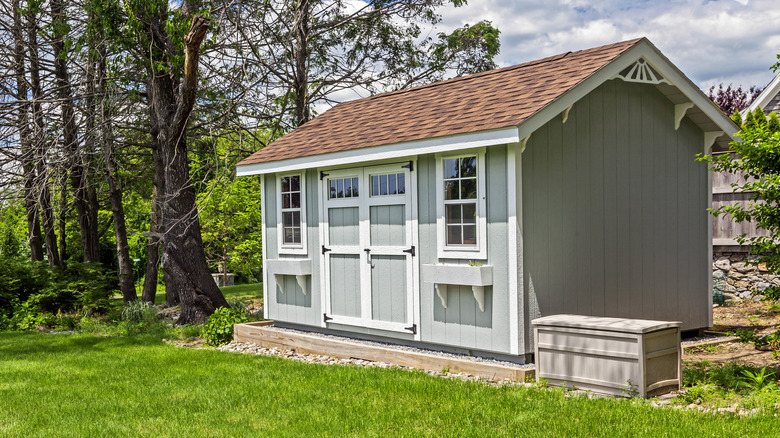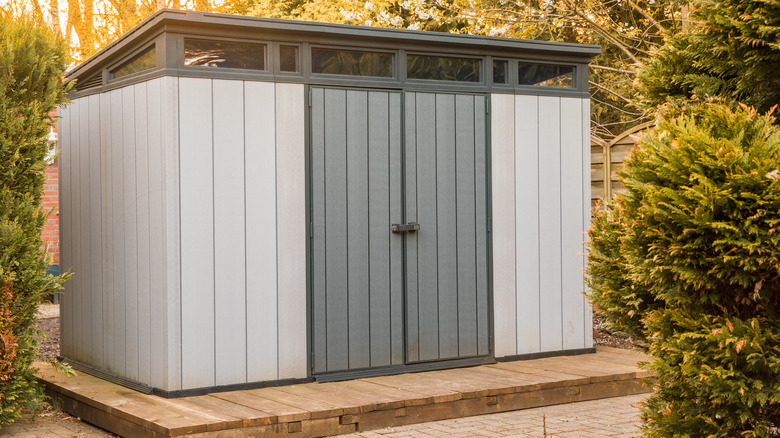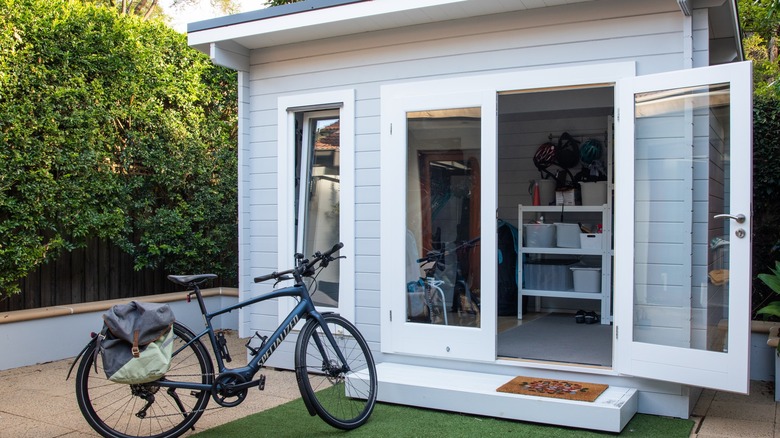The Most Durable Material For Your Backyard Storage Shed
You might have noticed that as you explore DIY options as a homeowner, the longer a conversation is, the more it tends to end up being about durability. That's a pretty deck, someone will say, but it will collapse into the earth from whence it came within 18 months. Or: If you build your roof like that, you'll have to go outdoors to stay dry in a rainstorm. And shed ownership is like a miniaturized but exaggerated microcosm of home ownership. Without cutting-edge construction methods and a budget that would cover a reliable Japanese car, your shed will be eaten by insects just before it collapses under its own weight.
Setting aside the drama, though, almost any shed is durable enough for some purpose. If you need something to keep most of the rain off of your lawn mower for a few years, you're more likely to have trouble with your HOA attacking your shed than with water or insects destroying it. On the other hand, it's not outrageous to think you can take decent care of a well-made shed and have it last a quarter-century. It's a matter of materials, but also of maintenance, and quality. Remember that maintenance includes avoiding some big mistakes when cleaning your storage shed, and quality happens in design as well as in materials.
The most (and least) durable: resin sheds
Resin sheds are often glommed together into one big category, but this type of shed is occupied by two very different inhabitants: vinyl and other plastics, usually high-density polyethylene (HDPE). These share many advantages and disadvantages: They are easy to assemble; are impervious to rot and deterioration caused by insect and rodent pests; require very little maintenance; and are moderately priced. On the other hand, they are all but impossible to customize, are easily broken into or collapsed, and are rejected by some homeowners (or homeowners associations) just on the basis of their looks. And they're less flexible than other options; you're far more likely to be able to turn your backyard wooden shed into a tiny home later than a vinyl or plastic one.
On the whole, vinyl is a more durable choice than its thermoplastic cousins. It's less likely to crack or warp than HDPE... an effect you're very familiar with if you've ever tried to disassemble and then reassemble a poly shed that's spent a season in a hot climate. Warping can make some polyethylene sheds all but impossible to rebuild with any real integrity. Poly is also more likely to fade and is less resistant to fire than vinyl. Often built atop a metal frame, vinyl sheds can also simply be more durable overall.
Comparing wood and metal sheds
There's nothing inherently wrong with making a shed out of metal. But, like plastic, it tends to occupy a space in popular consciousness usually reserved for Camaros propped on cinder blocks. This might be a byproduct of rust, which (rightly) communicates a lack of material quality. But properly treated, designed, and constructed metal buildings can be as permanent as anything else, hypothetically. However, as they're usually constructed, metal sheds leak more than their wood and plastic competitors, and they're almost as difficult as the plastic ones to customize.
In terms of life expectancy, you can rely on a metal shed to last less than five years. Plastic sheds might last 5 to 7 years. But vinyl and wood sheds can often last 25 years or more. A properly designed wood shed will resist rot and pests. And when combined with other materials — a metal roof, say, or vinyl siding — wood can be remarkably durable.
Durability is only partly a matter of material choice, though. Differences in material quality, the quality of construction, care taken in choosing a location, a proper choice of finish, and good maintenance habits are all hugely important. So whichever route you go, take all of these into account, and you'll end up with the shed you want for as long as you want. Top-rated buildings (and DIY shed kits you can put up in no time) come in all three forms, as do sheds that will collapse the moment you look away.


